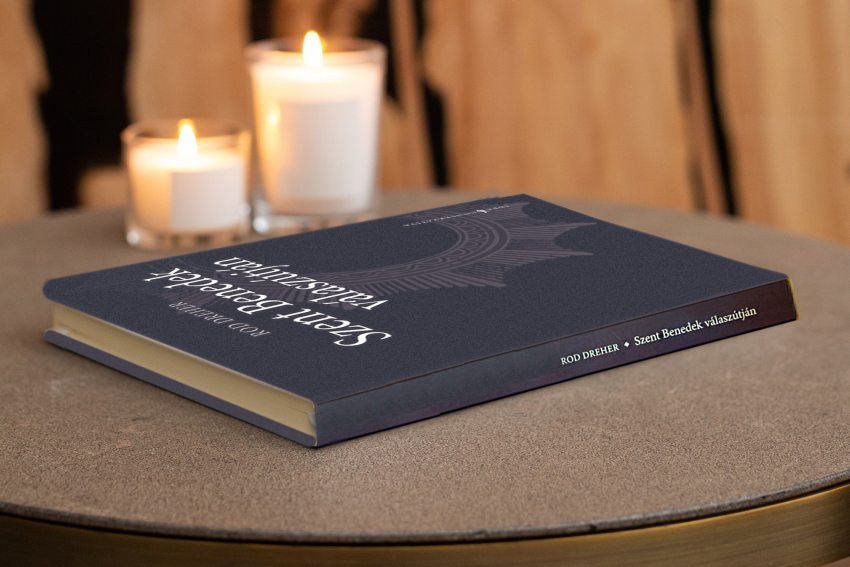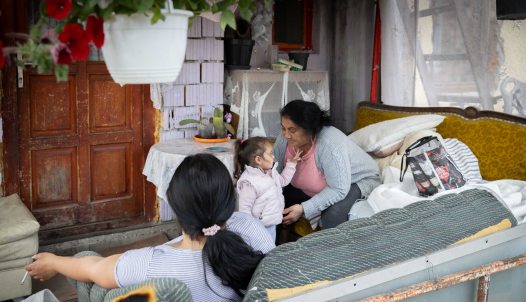How to survive the end of the Christian world? – The Benedict Option with Benedictine monk Gergely Bakos
One of the most thought-provoking books of recent times, it is both a utopia and a detailed survival guide to the rescue of Christian civilization. It is a vision of a future fraught with hardship, but not hopeless, as well as a lament for white civilization. Such are the reviews you can read about Rod Dreher's book entitled "The Benedict Option: A Strategy for Christians in a Post-Christian Nation ". But how does Gergely Bakos OSB see it, as the translator of the book and the one who is most familiar with it?

How did you come across Rod Dreher and his book?
When Osiris Publishing asked me to translate it, I had already read the book. In 2018, I personally received a signed copy from Rod Dreher at a book launch in Hungary, and we stayed in touch. The publisher needed a translator who was well versed in Benedictine topics, had a theological background, and spoke English well, which is how I came into the picture. It is a good and important book, I was happy to say yes.
This book, first published in 2017, uses mainly American social examples to outline the process of dying and the possible survival of our Western Christian culture. What direction can it show us here in Central Europe?
Originally written for Americans, it charts a possible trajectory for Christians in post-Christian America. It is not an academic work, but the book of an educated, broad-minded, courageous, and honest journalist. It is not combative, but outspoken, it calls society's problems by name, and it is novel in its practicality. Few Christians today, I find, know, and dare to confess clearly the joy and power of their faith. One of the great virtues of this book is that it is based on, and radiates from, the experience of that joy and power. It is also a great virtue that the author does not think that anyone who does not think like him is stupid or evil. Moreover, it is a tribute to Rod Dreher's political acumen and knowledge of human nature that he warned his fellow Christians against placing too much hope in conservative politicians, and his wisdom in doing so has been vindicated by the lessons of the Trump administration. He says that the alliance between political conservatism and Christianity is far from perfect and that politics cannot provide a solution to the crisis connected to Christianity. Many in Hungary do not yet understand Dreher's political truth.
I really like the fact that Rod Dreher, as an American, has recently been learning and taking inspiration from Czech and Hungarian culture, from the experiences of people who resisted communism.
He recognised that the experience gained here could be relevant in his own country, as the soft dictatorship that is being established in the West today is in many ways similar to the former communist authoritarianism. It is good to be confronted with the fact that we conservative and Christian Hungarians have something to teach to the world.
Am I correct that Rod Dreher changed denominations twice: from Methodist to Catholic, then to Orthodox?
Coming from a Southern, formally Methodist family, he was practically a non-believer when he was a teenager. His conversion began when he visited the cathedral in Chartres, France, and was gripped by the faith that built that magnificent building. Later, his encounter with Dante's great poem also became a milestone on his new path to Catholicism. I know from him that the pedophile scandals in the American Catholic Church deeply shocked him and led him to convert to the Orthodox Church. It is true that, in retrospect, he says that if he had had a stronger and less intellectual faith, prayed more, and engaged more in acts of charity, he would have remained a Catholic despite the scandals. However, despite the change to orthodoxy, he still speaks of the Catholic Church with great reverence. In his book, he cites two Benedicts as his main role models: St Benedict of Nursia, the founder of the Benedictine Order, and Pope Benedict XVI.
The book advises Christian believers, whose values are being increasingly displaced from North American and European society in today's ideological "war", to retreat into their own communities, reaffirm their roots, their faith, and save their religious heritage for a new era. Are you not afraid that this will encourage the reinforcement of some kind of traditionalist, past-living, pompous, theatrical, and legislatively-minded Catholicism?
He has already received similar criticism from a Vatican cardinal, who sees Dreher's vision of the Church as contradicting Pope Francis' vision of the Church as a field hospital for the world, rather than a fortress. Rod Dreher's response is that only the best-prepared team should be sent to the field hospital. How can the church function well as a field hospital on the front lines of sin, spiritual warfare, and wounding if it does not strengthen its hinterland?
Withdrawal in Rod Dreher's vision of the future does not mean total closure, running away, or spurious living in the past.
It is no coincidence that I chose as the motto of my epilogue the apt words of the Lutheran-turned-Orthodox theological historian Jaroslav Pelikan: "Traditionalism is the dead faith of the living, and tradition is the living faith of the dead." As Christians, we cannot avoid tradition, since the term refers to "what is handed down to us". It is faith that we receive as tradition from previous generations, it is faith that links us to the apostles and even to Jesus Christ himself! There is no other way, no bypass to Jesus.
Did Rod Dreher choose the Rule of St. Benedict as an example and a guide for future Christians, alongside the Bible, because while Scripture is more an example of mission, of outward openness, St. Benedict's Rule prepares us for an age after the collapse of an empire? It is as if the Rule of St. Benedict gives practical advice on how to be strengthened in small groups, to save our faith for a renewing world, and then offer it to again this new world.
Yes, the author recognised the similarities between our times and the historical Benedictine era some time ago. As early as the 1980s, the Scottish philosopher Alasdair MacIntyre drew a cautious but firm parallel between the fall of the Western Roman Empire and the moral crisis of our world in his work After Virtue, on which Dreher relies.
As a Benedictine monk, I was very impressed by Dreher's thorough knowledge of Benedictine tradition and practice - he is in contact with a well-established Benedictine community - but he does not want to copy what the monks have done, but as a layman he appreciates it in the context of modern life. His book is a kind of secular reading of the Benedictine way of life. He does not merely select elements from the Benedictine tradition that are applicable, but understands the spirit of the whole and applies it to secular life.
I am happy to admit that this book has helped me in my ongoing personal conversion, in taking my own Benedictine journey more seriously.
It is a practical book, then, because Dreher has grasped the sober, one might say down-to-earth, Benedictine lesson that the Christian life is not just a collection of ideals, but a practical life, and that the two can only make sense together. Unfortunately, in America and Europe today, there is too much emphasis on theoretical knowledge, while the kind of practical wisdom of how to do something is being pushed into the background. In countries - including our own - where the majority of citizens do not want to do physical work because they consider it menial, I think this is an important message: for example, physical work is part of our humanity!
This reminds me of my childhood when I saw a sign on an old apartment building near my home: 'Ora et labora', Pray and work. Is it true that this is one of the mottos of the Benedictines, because it is important to balance prayer and work?
This is a relatively recent 19th century slogan of a Benedictine community, which then spread. In fact, one essential thing was left out: reading the Scriptures. Our Rule of St Benedict could be summed up more as 'read the Scriptures, pray, work'. We must listen to God's word, talk to him, and put into action what we follow as an ideal. The aftermath of the paedophile scandals also proves that the external and internal credibility of the Church is very much influenced by how its members live their lives.
People rightly expect us believers to make a clear commitment to our values, to proclaim them and to live by them. If we do not, that is a big problem. But if we do not know what we stand for, we cannot live by it.
How good it would be to have a Christian village community organized according to Dreher, which would also be a spiritual community! But how would we get along with each other in such a village, when today there are many disagreements even within spiritual groups? After all, in an online group of like-minded members, we can also fall out.
It is a problem that we do not agree on certain issues within our Catholic communities, even though the Church's teachings are clear in many cases, and also carry a profound message. They are either not known by all or are overwritten out of individualism. Even if we meet only on Sundays and do not live in the same neighbourhood, this is a source of conflict. The church hierarchy, the clergy, do not communicate well why these teachings are important. And on the part of lay believers, the attitude that "I'll decide what's good for me and what's right" makes consensus difficult. This attitude is incompatible with any communal, institutional practice of religion because it is selfish.
But how can the crystallized wisdom of the Church's teachings be communicated in such a way that we not only see them as a set of rules, not only obey them, but also inwardly embrace them?
Dreher is right about the problem that we live in our emotions, we make our emotions absolute, and it is difficult to argue against them. If I listen only to my emotions, I do not hear the teaching of the Church, because I act according to what I feel. Also, many people introduce their personal opinions in this way: 'I feel that...' You can feel many things, but that doesn't mean you are right. This is a very common fallacy today, it leads to selfishness and the community of selfish people is going to fall apart. I have also heard from religious people, "God speaks to me in my intuitions." But if not the Scripture but my selfishness is the measure of what I feel now, then it is a fallacy. Jesus himself, in the Gospel as well as the monastic tradition warn us that we can be tempted to a great deal of evil through our emotions.
"The Benedict Option" touches on sexual culture, which is much more than just our sexuality, because it actually reveals our whole worldview. Dreher writes about how we do not dare to pass on to our children the Church's teaching on sexual morality.
The result of the sexual revolution is a great indulgence, a great permissiveness in sexuality. This has made our whole society short-sighted, so we don't talk about its moral, spiritual implications. For example, we are hardly allowed to say that the evil and harmful consequences of divorce are suffered most by innocent children. The blatantly justified cases do not justify the widespread bad practice of divorce. You don't have to be a Christian to see this great injustice, but unfortunately many Christians are also tolerant towards it.
No one likes to listen to unpleasant truths nor takes them seriously, even though we all suffer directly or indirectly because of them.
Do you think that Dreher's guidance can become common practice?
In the United States, there is a greater tradition of self-organising small communities and civic initiatives, so Dreher’s message certainly falls on fertile ground there. Here in Central Europe, unfortunately, this is not supported by our inherited attitude of always looking to the higher powers, leaders and institutions for solutions. It can only become a practice if book clubs and think-together groups are set up here too, where the book is read and discussed, and the desire to gradually put its message into practice is encouraged. I see that people of all age groups are reading it with interest.
Dreher says we need "Benedicts", or leaders. But what is a good Christian leader like?
A true leader is more than a skilful communicator. They are virtuous, a role model, punctual and decisive. They are ready to ask and to warn. They must listen personally to those they lead, even if they cannot solve their problems. And, of course, they need to make the traditions of the Church and living by those in the community attractive. This book is a great encouragement to take our own traditions seriously, and sooner or later community leaders will 'emerge' who are committed and resourceful, and who are willing to suffer for their communities.








